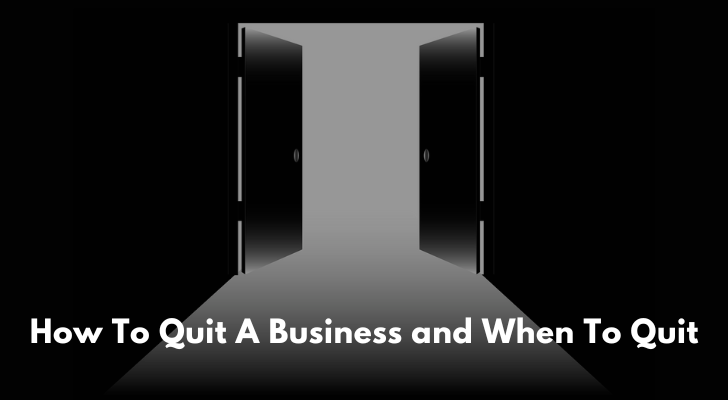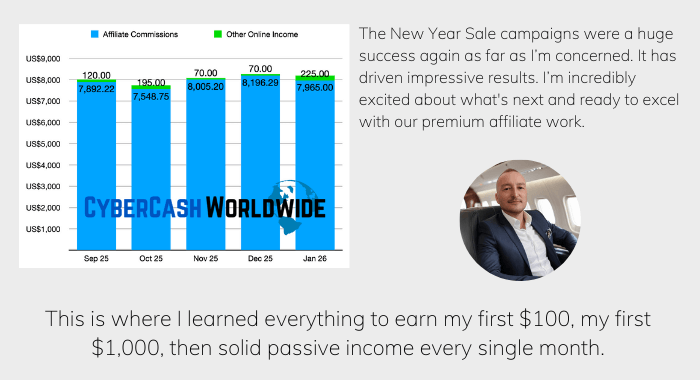The topic of quitting a business and recognizing the right time has been extensively discussed. Typical advice includes pivoting quickly, closely monitoring financial metrics, developing a formal exit plan, trusting intuition during burnout, and persisting through challenges.
Spend just the next 4 minutes to discover an eye-opening fact that may reshape your entire view on quitting, turning it from a perceived defeat into a strategic advantage.
Despite the title's focus, knowing when to quit is not chiefly about identifying signs like misalignment with goals, business stagnation, unfavorable markets, or personal burnout—these are important but not the priority. The least important factor is clinging to the venture out of pride or fear of sunk costs. Instead, approach quitting as a proactive, high-level strategy: a calculated pivot toward opportunities that better align with your core aspirations.
Reflect on these: What are your true long-term priorities—financial freedom, work-life balance, or broader impact?
If your current business consistently undermines them, are you holding on primarily due to fear of the unknown?
Answering "yes" to fear indicates you're ready for a structured exit plan, potentially leading to renewed energy and success elsewhere. If enjoyment persists in aspects but growth stalls, you might opt for targeted adjustments rather than full closure.
How would you rate market competitiveness in your niche—overwhelming or manageable with innovation? Affirming the former points to decisive, timely quitting for resource reallocation; the latter suggests resilience-building. Your responses determine if you'll embrace quitting as empowerment or view it as failure.
The decision to quit a business is never an easy one. But sometimes, it’s the best decision you can make - for your business and for yourself. You may lose what you’ve been thriving to build for a long time, you may feel that your business has been your life, and by quitting, you may feel like a failure. But you know that nothing lasts forever. When you call it a day, there’ll always be a positive side to it.
How To Know When It’s Time To Quit Your Business
The decision to quit should be based on a variety of factors, including your personal goals, the health of your business, and market conditions. If you're unsure whether or not it's time to quit your business, ask yourself these questions:
1. What are/were my long-term goals?
When you started your business, did you have a few long-term goals in mind? Did you imagine what you’d be doing in 3, 5, or 10 years’ time? Did you dream about growing the business steadily and eventually having a team of employees working for you? Did you want to be able to work from home and have a flexible schedule?
If so, these goals may have not changed much over time, though your focus may have shifted somewhat. You may realize that the most important thing is to maintain a good work/life balance. You need to make sure to take some time for yourself and your family. You need to be flexible and adapt as things change.
These goals can keep you motivated and focused when things get tough. Over time, however, it's easy for these goals to fade. If you find yourself in this situation, it's important to take a step back and reassess your priorities. Are your long-term goals still relevant? If so, what can you do to get back on track? Or is it best to forget it all and move on?
2. Is my business healthy?
The biggest reason you are considering ceasing trading may be that it’s not making enough profits. But other key factors that determine the health of your business are;
- Growth: Is there no way your business can grow any longer? Is there no sign of making any changes?
- Customer Satisfaction: Are your customers still happy with your service?
- Cutting Down The Costs: You may have already looked at all the expenses, but is there any way you can stretch by reducing your budget?
3. Are market conditions favorable for my business?
Is the market for your product or service growing? Are there new opportunities for marketing or selling your products?
Or is the industry becoming too competitive that it’s making your position weaker? If so, is it possible for you to come up with new methods to make you stand out from the crowd again?
4. Am I burned out?

Are you burned out?
Determine whether your business is failing or you're simply burned out. If you find yourself constantly feeling stressed and overwhelmed, it may be a sign that you're burned out rather than simply facing some challenges. It’s time to take a step back and assess the situation. If you're not enjoying running your business anymore, it may be time to call it quits.
5. Do I have other options?
You once committed yourself to this business which isn’t working out for whatever reason. Now you’re not making the same mistake again. So if you’re thinking about quitting, you must have another plan to do instead in the future.
This is a difficult question for you to answer because every business takes risks. So at least you need to take plenty of time to come up with other options.
If you are still making small profits, you may want to carry on until you decide what you want to do next. However, if your business is costing you more money than it is making, it may be time to cut your losses and look for temporary revenue sources, i.e. working as a contractor for another business. Only you can decide what is best for your situation.
If you can answer these questions honestly and make a decision based on your findings, you'll be in a better position to know when it's time to quit your business.
How To Go About Quitting Your Business
So to summarise, be honest with yourself and also be realistic about your prospects. If you’re not enjoying running your business anymore and you don’t think your business has a future, it’s time to move on.
Once you’ve decided to quit your current business, here are the steps you should be taking.
Talk To “Successful Quitters”
Talk to someone else about it. Sometimes it can be helpful to talk to someone else about how you can move on to the next journey.
Talk to other people who have quit their businesses. They can offer valuable insight and advice on what to expect and how to handle the situation.
Make Sure You Have a Solid Plan in Place
By this time, you should have formed a plan, or a rough idea, because without it, it would be much harder to stick with your decision to quit. But now you are determined to move forward, you ought to have a clear idea of what you want to do next and how you're going to make it happen. This includes things like having another project lined up or having enough savings to support yourself for a while.
Be Prepared for the Financial Consequences
Quitting your business can have a big impact on your finances, so make sure you're ready for it.
Making the decision to transition your business is never easy, but by taking the time to assess your situation and plan for the future, it can be less daunting.
Keep Good Business Relationships After You Quit

Maintaining good business relationships after you quit is important. Because you never know when you might need a favor or want to ask for advice. Positive relationships can lead to future opportunities, such as referrals or networking. Staying on good terms with clients, mentors, coworkers, and old bosses can make it easier to get a positive reference if you need one in the future.
Maintaining positive relationships with them can help you stay up-to-date on industry news and trends.
And needless to say, simply more pleasant to stay in touch with people you like and respect. It's simply the right thing to do - it’s a sign of respect and professionalism.
Here are a few tips on how to keep good business relationships after you quit:
Keep in touch with your former fellow entrepreneurs and clients.
Let them know what you are up to and keep them updated on your progress. This will show them that you still value their relationship and that you are willing to work with them in the future.
Be professional when communicating with them.
Even though you may be angry or upset about quitting, it is important to remain professional when communicating with your former contacts. Avoid badmouthing them or speaking negatively about the company; this will only reflect poorly on you. Instead, focus on the positive aspects of your time there and thank them for the opportunity.
Offer help when needed.
If your former employer or colleagues reach out to you for help, be willing to offer it. This shows that you are still invested in the relationship and that you want to see them succeed. It may also lead to new opportunities down the road.

Tell Your Clients The Change Of Your Circumstances
If you’ve decided to run a different type of business, it may be worth telling your clients your intentions. Because who knows your current clients will still be interested in what you're offering next, and they'll be willing to support whatever you decide to do? So tell your clients about the change and how it will affect them. Here are some tips for telling your clients about a change in your business:
- Be clear and concise about what is changing.
- Explain why the change is being made.
- Describe how the change will benefit your clients.
- Let your clients know what they need to do to prepare for the change.
- Provide support during and after the transition.
Ask Them To Continue To Support You
If you really want to make sure your clients are on board, then explain your situation a little more in detail;
1. Be transparent about the reasons for the change.
Your clients need to know why you're making the change and how it will benefit them. If you're honest and upfront about the reasons for the change, they're more likely to be supportive.
2. Communicate early and often.
Keep your clients in the loop from the start. Let them know what's happening and when they can expect things to happen. The more information they have, the less likely they are to be surprised or caught off-guard by the changes.
3. Offer support during the transition period.
Changes can be disruptive, so it's important to offer support to your clients during this time. Whether it's additional customer service or extended hours, make sure they know you're there for them during this transitional period.
4. Give clients plenty of notice.
If possible, let them know about the change well in advance so they can make any necessary arrangements.
5. Keep things as consistent as possible.
If there are going to be significant changes, try to make the transition as gradual and seamless as possible.
6. Be available to answer questions.
Your clients may have questions or concerns about the change, so be sure to address them in a timely manner.
7. Thank them.
Thank your clients for their understanding and patience during this time of transition. A little appreciation goes a long way.
Don’t Cling On

Life is too short to cling on to one thing.
It can be scary to let go of a business that you've been dedicating your heart and soul to for a long time. You might feel like you're losing a part of yourself. But sometimes, letting go is the best thing you can do.
When you’re hanging onto the past, you may miss out on new opportunities. You may be wasting your time and energy trying to fix something that’s beyond your control.
Especially when you’re running your own business, it's easy to get caught up in the day-to-day and feels like there are routines to carry out one after another. But remember that life is about more than just making sales, profits, or whatever it is that you're focused on. There's so much more to life than just the grind.
Letting go doesn't mean that you've given up or that you don't care anymore. It can be a sign of strength and courage because it means that you're willing to let go of what's no longer serving you. It also allows you to open yourself up to new possibilities.
Don’t get bogged down by one thing. Believe that the best choice is to move on when something is no longer working for you. Clinging on to things will only hold you back and prevent you from moving forward. So, let go of what's dragging you down and look forward to your new chapter.
Every End Comes a New Beginning
Quitting a business might feel like the end, but it's really a fresh start. Think of it as clearing out an old, cluttered room to make space for something new and exciting. It's a chance to take what you've learned, the good and the not-so-good, and use it to shape a future that gets you pumped.
Sure, it's a big move, and yes, it comes with its share of goodbyes. But it also opens up a world where you can explore new ideas, meet new people, and maybe even start another business with all the wisdom you've gained. It's not the closing of a book; it's just the end of a chapter.
With every end comes a new beginning, and who knows? The next thing you dive into could be even more amazing. So, here's to fresh starts and new adventures ahead!



Thank you for this incredibly empowering article. I have been running a small e-commerce side hustle for three years, and lately I have felt constant burnout while sales stagnated despite my best efforts. Your points about reassessing long-term goals and recognizing when market competition is too overwhelming really hit home for me. Quitting no longer feels like failure, but like a strategic pivot toward something that better aligns with my priorities of work-life balance and family time. The practical steps on how to inform clients transparently and maintain good relationships afterward are gold, they give me confidence to plan an exit gracefully. This piece has given me the courage to let go and explore new opportunities with excitement rather than fear. Truly inspiring, keep sharing such honest insights.
Thanks for sharing your experience, great to hear that the article helped reframe quitting as a positive step for you. Recognizing burnout early and prioritizing balance is wise, many entrepreneurs thrive more after a well-planned pivot. Wishing you success and renewed energy in whatever comes next.
Thank you for writing this refreshing take on quitting a business. As a mom with a freelance graphic design venture that started strong but now drains me with inconsistent clients and high competition, your words feel like a weight lifted.
Viewing quitting as empowerment and a new beginning, rather than defeat, changes everything. The tips on checking for burnout versus normal challenges, preparing financially, and letting go without clinging to the past are exactly what I needed to hear right now.
I feel motivated to develop an exit plan, talk to others who have quit successfully, and focus on opportunities that fit my current life stage better. This article came at the perfect time, thank you for the encouragement and clarity.
Thank you for your kind words, Clair. I’m happy the perspective shift helped ease that weight and provided timely encouragement. Balancing family with business is tough, and choosing alignment now often opens fulfilling doors later. Best wishes as you plan your next chapter with confidence.
Thank you for the detailed guide on this often overlooked topic. I see a good framework for evaluating when to quit, with useful questions for self-reflection on goals, business health, market conditions, and burnout.
I appreciate the emphasis on having alternative plans in place and handling the exit professionally, including transparent communication with clients and preserving relationships. It is a pragmatic reminder that persistence is valuable, but not at the expense of long-term well-being or opportunities elsewhere.
The distinction between temporary challenges and fundamental misalignment is particularly helpful for objective decision-making. Overall, a solid resource for anyone at a business crossroads considering their options carefully.
Thanks for your thoughtful feedback. I am glad the reflective questions and practical advice resonated as a balanced tool for decision-making. Objectivity in these moments is key, and professional exits often lead to better networks later. Appreciate you taking the time to read and comment.
Reading this article came at a pivotal time for me as I've been grappling with my side hustle that's plateaued. The signs to quit, like misalignment with long-term goals and persistent burnout, mirror my situation exactly. I started my freelance consulting gig for flexibility, but constant stress has eroded that joy. Recognizing unfavorable market conditions, such as increased competition in my niche, has made me reassess without guilt. The advice to talk to successful quitters is practical—I've already reached out to a mentor who shared similar transitions.
The steps for quitting emphasize planning, which I hadn't fully considered. Developing a solid exit strategy, including financial cushions and alternative revenue like contracting, eases the fear of the unknown. Maintaining good relationships is wise; burning bridges could haunt future opportunities. Informing clients transparently, with ample notice and support during handover, shows professionalism that could lead to referrals elsewhere. This structured approach turns quitting from a failure into a strategic pivot.
I appreciate the focus on viewing quitting as a new beginning. Letting go of what's no longer serving opens doors to fresh ideas, as the article notes. In my case, clinging to a stagnant business has prevented me from exploring passions like content creation. The reminder to avoid negativity in communications is key—I've seen peers damage their networks by venting frustrations publicly.
Overall, this piece demystifies quitting, framing it as a strength rather than defeat. It's empowered me to plan my exit thoughtfully, using lessons learned for future ventures. More examples of real quitters' stories would be enriching, but the core advice is solid. Thanks for this honest take—it's rare to find content that addresses the emotional side of business decisions.
Syed, we appreciate your candid feedback and are pleased the article resonated during your challenging time. It’s great that the signs of burnout and market shifts helped you reassess, and we’re glad the planning steps and emphasis on positive relationships are guiding your transition. Viewing quitting as a new chapter is indeed empowering—best wishes on your content creation pursuits! We’ll aim to include more real-life stories in updates. Thanks for engaging!